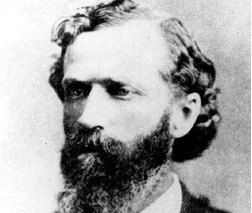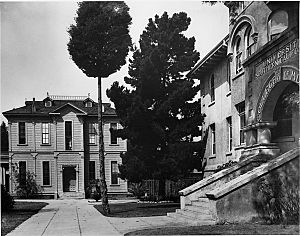Joseph Widney facts for kids
Quick facts for kids
Joseph Pomeroy Widney
|
|
|---|---|

As president of University of Southern California
|
|
| Born | December 26, 1841 |
| Died | July 4, 1938 (aged 96) |
| Nationality | American |
| Occupation | Doctor, educator, historian, religious leader |
| Known for | co-founding Los Angeles Medical Society and the Church of the Nazarene |
Joseph Pomeroy Widney (born December 26, 1841 – died July 4, 1938) was an important American doctor, teacher, historian, and religious leader. He helped shape the city of Los Angeles, California, for nearly 70 years.
After serving in the American Civil War, Joseph Widney became a doctor. He moved to California, where his brothers already lived. He thought Southern California was a beautiful place, like a "Garden of Eden." In Los Angeles, he helped start the Los Angeles Medical Society.
He strongly supported the new University of Southern California (USC). He became its second president and helped create its medical school. He was also very interested in the Los Angeles Public Library.
Widney invested in land in California and became an early environmentalist. He believed Los Angeles would become a major city with a big seaport. He imagined the city getting water from across the mountains and even recreating a large ancient lake called Lake Cahuilla.
He also helped start the Church of the Nazarene in Los Angeles. He was a Methodist pastor too. He wrote many books about California's history and his ideas for the state. He lived to be 96, seeing Los Angeles grow into the major city and seaport he had dreamed of.
Contents
Early Life and Education
Joseph Pomeroy Widney was born on December 26, 1841, in Piqua, Ohio. He was the third son of John Wilson Widney and Arabella Maclay Widney. When he was 15, his father passed away.
After finishing Piqua High School, he studied at Miami University in Ohio. Later, in 1907, he received an honorary Doctor of Laws degree. This was for his important book, Race Life of the Aryan Peoples.
In 1861, Joseph joined the Union Army during the American Civil War. He worked as a medical helper on ships along the Ohio and Mississippi rivers. He left the army in 1862 due to health issues.
His older brothers and uncle, Charles Maclay, encouraged him to move to California. He sailed to San Francisco in November 1862. He explored California, visiting old missions and living with Spanish-speaking people.
In 1865, he went back to college and earned a Master of Arts degree. In 1866, he moved to San Francisco. He then studied medicine at Toland Medical College (which later became part of the University of California, San Francisco). He graduated at the top of his class with a Doctor of Medicine (M.D.) degree on October 2, 1866.
Joseph Widney was married twice. His first wife, Ida DeGraw Tuthill Widney, passed away in 1879. His second wife was Mary Bray. They married in 1882. In 1884, a big flood in the Los Angeles River destroyed their home. Mary Bray Widney helped organize flower festivals to raise money for a home for poor working women. She passed away in 1903. Joseph Widney never married again.
Medical Career and Public Health
After graduating from medical school, Joseph Widney rejoined the army as a military surgeon. He worked in California and the Arizona Territory during the Apache Wars.
In 1868, he left the army and moved to Los Angeles. He started his medical practice with another doctor. Famous people like General William Tecumseh Sherman were his patients.
Before 1876, doctors in California didn't need licenses. Widney helped create the Los Angeles County Medical Association in 1871. This group wanted to improve medical standards and start medical schools. Widney believed in helping "the sickly poor" as part of public health. He was one of the first doctors licensed by the medical society and became its president in 1877.
He strongly believed in scientific medicine and did not support faith healing. In 1886, he suggested a plan for studying medicine at the University of Southern California. He also pushed for the creation of health boards in Los Angeles and California. He became Los Angeles' first public health officer.
He helped restart the Southern California Medical Society in 1884. He also helped create the Southern California Practitioner, a medical journal, and was an editor for several years.
Author and Visionary
In 1872, Joseph Widney helped start the Los Angeles Library Association. He served on its board for six years. He also co-wrote the first history of Los Angeles County in 1876. Later, in 1888, he worked on California of the South, one of the first travel guides for California.
His most famous book was the two-volume Race Life of the Aryan Peoples, published in 1907. He often published his own books. Widney once said he never wrote for money. He wanted to help humanity grow and improve.
Widney was interested in weather and protecting nature. He worried about water conservation. He also warned about what we now call smog in 1938, long before it was officially recognized in Los Angeles.
He wanted to protect three large forest areas for future generations. In 1873, he suggested flooding the Colorado Desert to bring back Lake Cahuilla.
In his 1935 book, The Three Americas, Widney suggested that the lost city of Atlantis was in the area of the Bahamas. He thought it was an island settled by people from the Americas, not Europe. He also believed there was another lost continent in the South Pacific Ocean.
Developing California
Joseph Widney saw the great potential of Los Angeles when he first visited in 1867. His brother, Robert Maclay Widney, was a lawyer and judge, and Los Angeles' first real estate agent. Joseph invested in land in Los Angeles, which made him financially independent. He retired from practicing medicine at age 55.
He owned several important properties in Los Angeles, including the land where the Los Angeles City Hall now stands. He also owned much of Mount Washington, Los Angeles, where his last home was located.
In 1885, during a big land boom in Los Angeles, Widney bought a huge amount of land (35,000 acres) northeast of the city. He formed a company to create a new town called Hesperia.
Widney strongly supported the growth of Los Angeles. Even at 95, he wrote a plan for Los Angeles to become a "Great World Health Center." He proposed new roads and tunnels to connect the city with the desert. He believed the Port of Los Angeles and water from the Colorado River were key to the city's future.
He was a member of the Los Angeles Chamber of Commerce. His early books promoted California as a great place for health-seekers.
Public Service and Education
Widney helped shape the rules for railroads, shipping, and business in Southern California. He and his brother Robert were important in getting funding for the harbor at San Pedro, Los Angeles (now the Port of Los Angeles). He also fought to keep the harbor lands public, preventing railroad companies from taking them over.
Widney believed California should be divided into two states to have more power in the U.S. Senate. He felt that two different groups of people were growing up in the northern and southern parts of the state.
In his book The Three Americas (1935), Widney suggested that the United States should buy British Guiana from the United Kingdom. He thought it could be given to African Americans as a form of reparations for slavery.
He was also a strong supporter of temperance, which meant limiting the making and selling of alcohol. He led the city's anti-saloon league.
Joseph Widney is known as a very important early educator in Los Angeles. He was involved with the University of Southern California (USC) from its very beginning in 1879. He served on USC's Board of Trustees for many years.
He was key in creating the USC College of Medicine in 1885 and served as its first dean for eleven years. USC was open to all students, regardless of "race, color, religion or sex."
After USC's first president passed away, Widney became the second president in 1891. USC was facing financial difficulties at the time. Widney helped raise money and even used his own money to save the university from going bankrupt. He resigned in 1895 after four years of hard work, having helped USC through its financial crisis.
Besides his work at USC, Widney also served as a member and president of the Los Angeles Board of Education.
Religious Interests
Joseph Widney grew up in the Methodist Episcopal Church. His uncle, Robert Samuel Maclay, was a famous Methodist missionary to China, Japan, and Korea.
In Los Angeles, Widney supported the Los Angeles City Mission, which helped people in need. He and Phineas F. Bresee wanted to create a church for the poor. On October 30, 1895, they founded the Church of the Nazarene. Widney suggested the name for the new church.
Later, Widney returned to the Methodist church as a pastor. He led the Nazarene Methodist Episcopal Church, which grew so much that a new building was needed. He paid for the entire cost of the new building himself and served without pay. He resigned from the Methodist Episcopal church in 1911.
Later Years and Legacy
Joseph Widney believed his long life was due to living simply and staying busy. At 94, he advised avoiding alcohol, tobacco, and drugs. He also recommended getting at least eight hours of sleep each night.
He passed away on July 4, 1938, at his home in Highland Park, Los Angeles, at the age of 96. He was buried at the Evergreen Cemetery.
In 1939, a new high school for children with special educational needs was named Dr. Joseph Pomeroy Widney High School. The Widney Alumni House at the University of Southern California, which was the university's first building, is now a historic landmark. USC also gives out the Widney Alumni Award to honor its outstanding graduates.
List of Works
Books (co-authored)
- Lindley, Walter and Joseph Widney. California of the South: Its Physical Geography, Climate, Resources, Routes of Travel, and Health-Resorts Being a Complete Guide-Book to Southern California. D. Appleton and Company: 1888; 3rd edition; 1896.
- Warner, J. J.; Benjamin Hayes; and Joseph Widney. An Historical Sketch of Los Angeles County, California: From the Spanish Occupancy, By the Founding of the Mission San Gabriel Archangel, September 8, 1771, to July 4, 1876. Prepared by a committee appointed by the Literary Committee of the Los Angeles Centennial Celebration. Louis Lewin & Co.: 1876; Reprint ed. O. W. Smith: 1936.
 | Emma Amos |
 | Edward Mitchell Bannister |
 | Larry D. Alexander |
 | Ernie Barnes |


